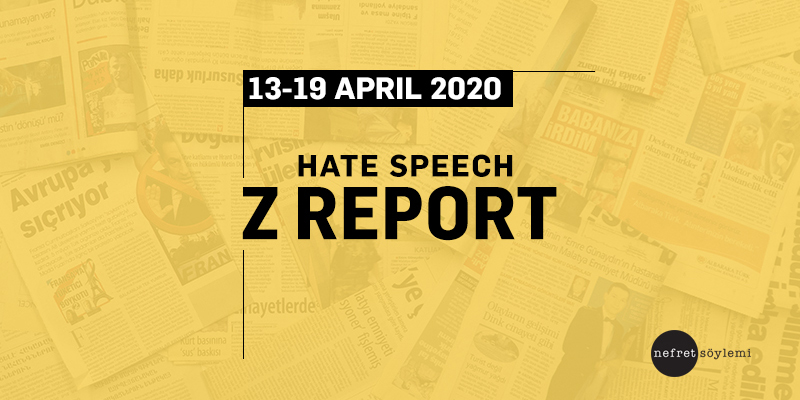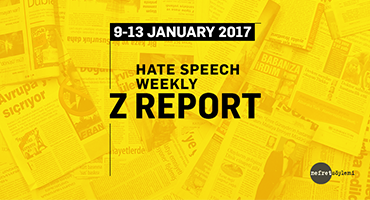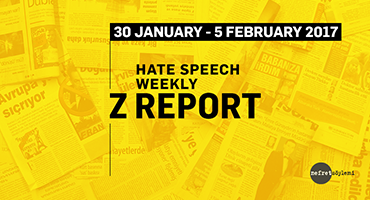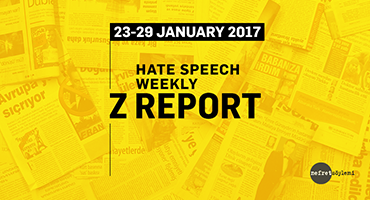Within April 13-19, 2020, three articles that generate hate speech were selected from print media. You can find three articles that contain hate speech against LGBTİ, Armenians, Buddhists, Jews, and others as well as the analyses written about them below.1
1.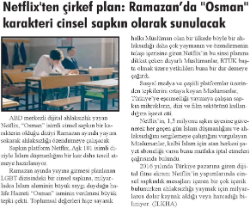
The article published din Diyarbakır Özgür Haber Gazetesi with the title “Netflix’ dirty plan: the character “Osman” will be introduced a sexual pervert on Ramadan” considers LGBTI individuals as a “threat” against “the morals of a Muslim country” and targets them as we see in the following remarks: “Perverted platform Netflix is about to confirm its Islamophobia once again with the show Love 101. Planned to be aired on Ramadan, this LGBT show caused serious reaction since it named a sexual pervert after Osman, who is a caliphate respected by billions of Muslims. Sensitive Muslims who points to this sneaky plan of Netflix, which is anxious to spread and promote this immorality in a Muslim country, urged the Supreme Board of Radio and Television and other officials to take action. Expressing their reaction via social media and various platforms, Muslims stated that perverted groups trying to spread homosexuality in Turkey are using film industry.” |
2.
Suat Ungan, in his column titled “Turks and hygiene”, insults Christians and Armenians, making negative generalizations about them as we see in the following sentences: “Foreign travelers also noticed how Turks valued hygiene. Visiting the Ottoman Empire, traveler Ricaut wrote that Turks are very clean people who considers washing themselves as good deed, they don’t think highly of Christians since they don’t clean themselves, Turks wash their hands before and after eating and believe that God created food to make them wash their hands more often”, “During a major fire in Sivrihisar, Christians suffered a loss of 30 million. Turks were reluctant to open their homes for desperate Armenians, but when they did let them stay, they threw the mattresses from the windows after their guests left, because they were tainted by the bodies of the infidels. This story was told as an example of Turkish extremism. But when I was in Armenia, I understood that it was wise not to let them stay or throw away the mattresses after they showed their kindness by letting them stay. Armenians don’t care about personal hygiene. They are really filthy. Their houses and cloths are swarmed with insects. On the other hand, Turks are very clean.” In this way, he foments the existing prejudices against Christians and Armenians. |
3.
Burhan Bozgeyik, in his column titled “You were so calm watching the oppression and cruelty from afar!”, associates Europeans, Americans, Russians, the Chinese, Buddhists and Jews with violence and labels them as anti-Muslim: “They said ‘Oil in the north is mine, oil in the south is yours.’ And they tried all the weapons they had on innocent people. More than a million people were killed. 9 million people lost their homes, country and houses, becoming refugees. Some of them drowned, some of them died on the roads. Europeans, Americans, Russians, the Chinese etc. just watched”, “Buddhist monsters burned, dismembered and raped the Muslims in Rakhine. Thousands of people fled to other countries to save their lives. The world watched it” and “Palestinian lands were pillaged every day, their houses were destroyed. Jews got more and more spoiled, they went rabid. Gaza was already sieged. Spoiled Jews showered Gaza with bombs whenever they got bored. The world watched it”. |
4.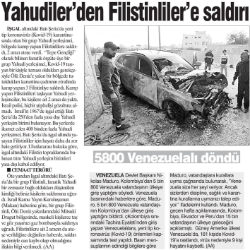
The article published in Günboyu Gazetesi with the title “Jews attacked Palestinians” holds all members of an identity responsible with a generalizing description. Thus, the article foments prejudice and enmity against Jews. |
1. Within the scope of the media monitoring work focusing on hate speech, all national newspapers and around 500 local newspapers are monitored based on pre-determined keywords (e.g. Traitor, apostate, refugee, Christian, Jewish, separatist, etc.) via the media monitoring center. While the main focus has been hate speech on the basis of national, ethnic and religious identities; sexist and homophobic discourses are also examined as part of the monitoring work.

